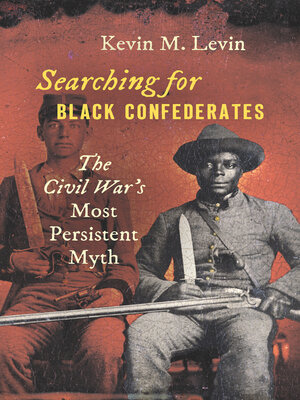Searching for Black Confederates
ebook ∣ The Civil War's Most Persistent Myth · Civil War America
By Kevin M. Levin

Sign up to save your library
With an OverDrive account, you can save your favorite libraries for at-a-glance information about availability. Find out more about OverDrive accounts.
Find this title in Libby, the library reading app by OverDrive.



Search for a digital library with this title
Title found at these libraries:
| Library Name | Distance |
|---|---|
| Loading... |
More than 150 years after the end of the Civil War, scores of websites, articles, and organizations repeat claims that anywhere between 500 and 100,000 free and enslaved African Americans fought willingly as soldiers in the Confederate army. But as Kevin M. Levin argues in this carefully researched book, such claims would have shocked anyone who served in the army during the war itself. Levin explains that imprecise contemporary accounts, poorly understood primary-source material, and other misrepresentations helped fuel the rise of the black Confederate myth. Moreover, Levin shows that belief in the existence of black Confederate soldiers largely originated in the 1970s, a period that witnessed both a significant shift in how Americans remembered the Civil War and a rising backlash against African Americans’ gains in civil rights and other realms.
Levin also investigates the roles that African Americans actually performed in the Confederate army, including personal body servants and forced laborers. He demonstrates that regardless of the dangers these men faced in camp, on the march, and on the battlefield, their legal status remained unchanged. Even long after the guns fell silent, Confederate veterans and other writers remembered these men as former slaves and not as soldiers, an important reminder that how the war is remembered often runs counter to history.
Levin also investigates the roles that African Americans actually performed in the Confederate army, including personal body servants and forced laborers. He demonstrates that regardless of the dangers these men faced in camp, on the march, and on the battlefield, their legal status remained unchanged. Even long after the guns fell silent, Confederate veterans and other writers remembered these men as former slaves and not as soldiers, an important reminder that how the war is remembered often runs counter to history.







